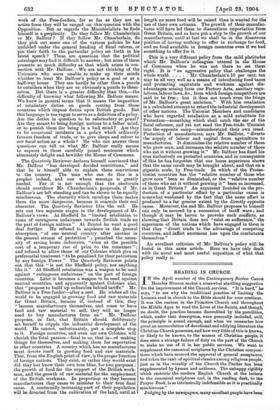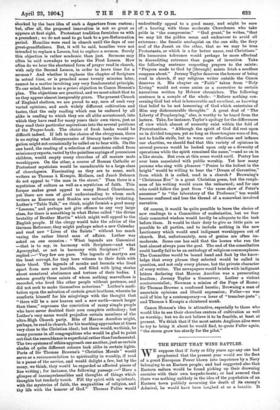shocked by the bare idea of such a departure from
custom ; but, after all, the proposed innovation is not so great as appears at first sight. Protestant tradition furnishes us with a precedent; we do not need to go back to a pre-Reformation period. Homilies were read in church until the days of our great-grandfathers. But, it will be said, homilies were not intended to replace a Lesson, but to replace a sermon. Surely this objection is rather academic, than just. Sermons may often be said nowadays to replace the First Lesson. How often do we hear the shortened form of prayer read in church, with only the Second Lesson, in order to leave time for a sermon P And whether it replaces the chapter of Scripture in actual time, or is preached some twenty minutes later, cannot be a matter involving any very fundamental principle. To our mind, there is no a priori objection to Canon Henson's plan. The objections are practical, and we must admit that to us they appear almost insuperably grave. The present Church of England shelters, we are proud to say, men of such very varied opinions, and such widely different cultivation and tastes, that the only reading which can be endured by all alike is reading to which they are all alike accustomed, into which they have read for many years their own views, just as they read their particular aspirations into the several petitions of the Prayer-book. The choice of fresh books would be difficult indeed. If left to the choice of the clergyman, there is no saying what idiosyncrasies of literary taste the congre- gation might not occasionally be called on to bear with. On the one band, the reading of a selection of anecdotes culled from missionary reports, varied by the pointless sayings of precocious children, would empty many churches of all mature male worshippers. On the other, a course of Roman Catholic or Protestant mysticism would be unendurable to a large class of churchgoers. Fascinating as they are to some, such writers as Thomas it Kemple, Molinos, and Jacob Behmen do not appeal to "the man in the street." Then there is a mysticism of culture as well as a mysticism of faith. This former makes great appeal to many Broad Churchmen, yet 'there are men of good understanding to whom such writers as Emerson and Ruskin are unbearably irritating. Luther's "Table Talk," we think, might furnish a good many "Lessons," and perhaps not give offence to any very large class, for there is something in what Heine called " the divine brutality of Brother Martin" which might well appeal to the English people. If the clergy would take the advice of the German Reformer, they might perliaps select a new Calendar and read new " Lives of the Saints " without too much vexing the rather literal man of affairs. Luther was asked on one occasion " What legends are Canonical —that is to say, in harmony with Scripture—and what Apocryphal, or not in harmony with Scripture ?" He replied :—" Very few are pure. The legends of martyrs are the least corrupt, for they bore witness to their faith with their blood. The legends of monks and hermits who lived apart from men are horrible, and filled with lying stories about unnatural abstinence and torture of their bodies. I esteem greatly those saints of whom nothing marvellous is recorded, who lived like other people without pretence, and did not seek to make themselves notorious." Luther's medi- tation upon the salvation of certain great heathens, wherein he comforts himself for his misgivings with the thought that " there will be a new heaven and a new earth—much larger than these," expresses the conviction of many simple people who have never doubted their own complete orthodoxy; but Luther's very name would prejudice certain members of the ultra-High Church party. Bits of Marcus Aurelius might, perhaps, be read in church, for his teaching approaches at times very close to the Christian ideal; but there would, we think, be many persons in all congregations who would be glad to point out that the resemblance is superficial rather than fundamentaL The two systems of ethics approach one another, just as certain shades of quite different colours look alike in certain lights. Parte of Sir Thomas Browne's "Christian Morals" would serve as a recommendation to spirituality in worship, if read in a pause of the service, and would, delight a few, but by the many, we think, they would be regarded as affected pieces of fine writing ; for instance, the following, passage :—" Have a glimpse of incomprehensibles and thoughts of things which thoughts but tenderly touch. Fill thy spirit with spirituals, with the mysteries of faith, the magnalities of religion, and thy life with the honour of God." Thomas Fuller would Of course, it would be quite possible to leave the choice of new readings to a Committee of ecolesiaatics, but we fear their concerted wisdom would hardly be adequate to the task before them. It would be their duty to give as little pain as possible to all parties, and to include nothing in the new Lectionary which would send indignant worshippers out of church. But, unfortunately, men of genius are often im- moderate. Some one bas said that the horses who run the best almost always pass the goal. The end of the consultation could hardly fail to be an anthology of religious commonplaces. The Committee would be bound hand and foot by the know- ledge that every phrase they selected would be called in question, and not only every phrase, but the private character of every writer. The newspapers would bristle with indignant letters declaring that Marcus Aurelius was a persecuting heathen; Jeremy Taylor a timeserver; Luther a violent controversialist; Newman a minion of the Pope of Rome ; Sir Thomas Browne a confessed heretic; Browning a man of uncertain opinions and illucid expression; Fuller—as was said of him by a contemporary—a lover of " trencher-jests" ; and Thomas it Kempis a cloistered monk,
Canon Henson's idea is attractive, especially to those who would like to see their churches centres of cultivation as well as worship ; but we do not believe it to be feasible, at least at present. We think that if the most astute Anglican alive were to try to bring it about be would find, to quote Fuller again, "the storm grow too sturdy for the pilot."
THE SPIRIT THAT WINS BATTLES.
liVrE suppose that if forty or fifty years ago any one had prophesied that the present year would see the fleet of a great European Power blown into impotence by a Navy belonging to an Eastern people; and had suggested also that Eastern sailors would be found picking up their drowning enemies with their own torpedo-boats ; or had, averred that there was nothing unlikely in the idea of the population of an Eastern town publicly mourning the death of its enemy's Admiral, he would have been laughed at as a lunatic. It











































 Previous page
Previous page